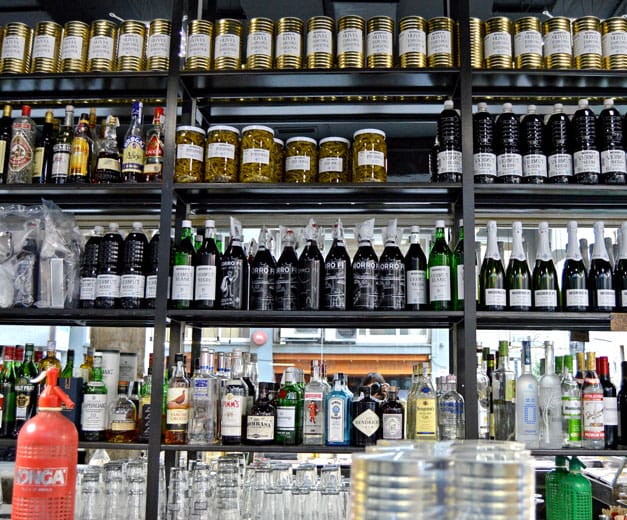Think of Ramadan, which just began in many parts of the world, as a kind of monthlong biathlon that consists of an all-day race to beat back the hunger and thirst of fasting, followed by an all-night marathon of eating and drinking in order to fortify the body for the next day’s fast.In recent years in Turkey, iftar, the traditional break fast meal that used to mostly consist of some dates and a freshly baked round of Ramadan pide, has started to become an increasingly trendy affair, with ministers, businessmen and regular people trying to make an impression by hosting ever more lavish meals.
Still, even if you’re not fasting, a traditional iftar meal at the right place remains a unique and tasty window onto life during the Ramadan period. Below is a list of our favorite spots for iftar in Istanbul (note: reservations are recommended):
One of our latest favorites is Osmanbey’s Mahir Lokantası, which serves an array of regional dishes from all over Turkey that are cooked with an impressive level of precision and a palpable portion of love. Their ifta menu is a serious affair, featuring their wonderful mumbar dolması (stuffed intestines) içli köfte (ground beef-filled bulgur pockets, similar to kibbeh) a choice of kaburga dolması (rice-filled lamb ribs) or a mixed grill plate. This is in addition to soup, salad, fruit, dessert, and other Ramadan-accoutrements. Even if you aren’t fasting, you may want to think about doing so before stepping up to this iftar.
Siirt Şeref Büryan Kebap Salonu feeds 450 customers every night during Ramadan, the month-long period of daily fasting which ends on Tuesday. Their famed büryan lamb kebab cooks for two hours on hooks lowered into a sealed pit, with only salt to draw out the flavors. Bones are removed from the meat and cooked separately to impart flavor to the meat. The result is succulent, and it is served on a round of lavaş; lamb on toast, Siirt-style. Perde pilav, a traditional wedding dish of chicken in a rice crust cooked in a tin pot, is also served, as well as a flat, Siirt version of içli köfte (cooked ground meat stuffed inside a bulgur shell). The owners, brothers Beşir and Levent, have another branch in Siirt and have served Martha Stewart, among others, their büryan.
Another classic Ramadan experience is heading to Aksaray’s Ciğeristan (literally, Land of Liver). This popular grillhouse lines the sidewalks with extra tables and chairs during the holy month, and it is liable to get packed, so reservations may be necessary. Expect succulent skewers of perfectly cooked liver and a selection of equally-excellent kebabs, such as the tavuk şiş. If you show up to a full house, do not despair, for you are in Aksaray, a true culinary paradise with many worthy alternatives nearby. We’d recommend traipsing up the street and trying your luck at the excellent grillhouse Babo’nun Yeri, or Has Kral, with its tantalizing selection of Hatay-inspired meze and truly surreal setting.
 Although no excuse is needed to visit the well-known Çiya – one of our favorite restaurants in Istanbul – during Ramadan they are serving up a special iftar menu which, like the restaurant’s regular menu, will likely change daily and feature lesser-known regional specialties from around Turkey. Highly recommended.
Although no excuse is needed to visit the well-known Çiya – one of our favorite restaurants in Istanbul – during Ramadan they are serving up a special iftar menu which, like the restaurant’s regular menu, will likely change daily and feature lesser-known regional specialties from around Turkey. Highly recommended.
Located in the Asian side’s Üsküdar neighborhood, Kanaat, is an esnaf lokantası (tradesmen’s cafeteria) that has grown into something bigger and classier, with an almost overwhelming selection of very nicely made prepared dishes served from what seems like a mile-long steam table.
Unlike Kanaat, Şahin Lokantası has remained a humble, yet bustling, esnaf lokantası, with two small floors and a smaller menu of classic dishes prepared with a lot of love. It’s another one of our favorite places in town.
This was originally published July 9, 2014, and has been updated.
 February 7, 2014 Morro Fi and Mitja Vida
February 7, 2014 Morro Fi and Mitja Vida
Morro Fi and Mitja Vida are two relatively new entrants to Barcelona’s vermuteo […] Posted in Barcelona January 12, 2018 Shavi Lomi
January 12, 2018 Shavi Lomi
In the Caucasus, guests are considered gifts from God. Georgians like to call them okros […] Posted in Tbilisi January 29, 2019 Market Watch
January 29, 2019 Market Watch
Mark Twain once famously remarked, “The reports of my death are greatly exaggerated.” […] Posted in Tokyo
Published on June 08, 2017
Related stories
February 7, 2014
BarcelonaMorro Fi and Mitja Vida are two relatively new entrants to Barcelona’s vermuteo (“vermouthing”) culture, whose history stretches back to the turn of the last century. These two bars are the product of nostalgia for a bygone era fused with the social network- and urban design-driven present. The vermouth tradition in Barcelona was started in…
January 12, 2018
TbilisiIn the Caucasus, guests are considered gifts from God. Georgians like to call them okros stumrebi – “golden guests” – an endearment that illustrates the stature the ever-hospitable Georgians give to those they host. And whenever our own golden guests come to visit in this remote corner of the world, we never fail to entertain…
January 29, 2019
TokyoMark Twain once famously remarked, “The reports of my death are greatly exaggerated.” Perhaps Tokyo’s beloved and historic Tsukiji Market can say the same. Several years ago the Metropolitan government declared that Tokyo’s Tusikiji fish market needed to be relocated to a more efficient and workable location. Construction was begun on a new state-of-the-art site…

















































































